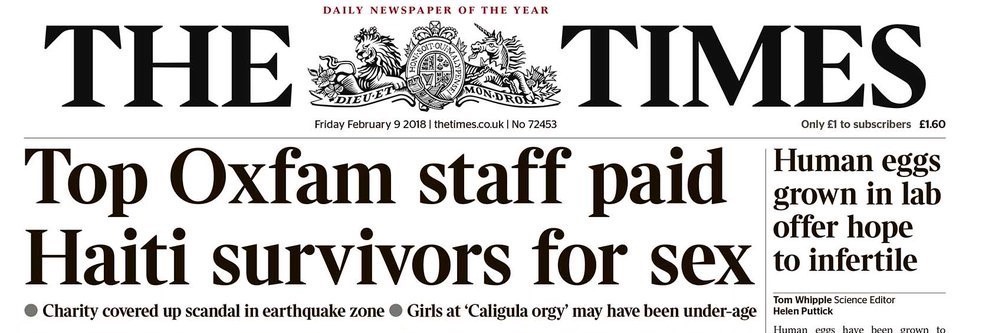HuffPost Italia Blog – Marco Crescenzi, President of the Social Change School
Marco Crescenzi‘s collaboration with the HuffPost Italia Blog goes on with the article “Why are NGOs and social sector constantly under attack?”, published on April 2, 2018.
Original article here.
During the past months, many well-known NGOs have been subject to accusations or criticism by the press. Those accusations have greatly amplified some behaviours of penal significance and of an infinitesimal number of workers, who were however reported, fired or removed by the NGOs. There is also some arrogance emerging, especially among UK NGOs.
To be clear, I immediately and clearly stated the position of Social Change School: “zero tolerance”, which is the same position of the NGOs.
However, there are very few actual behaviours of penal relevance against beneficiaries of the interventions – very few units over tens of thousands of operators: for Oxfam GB 7 people out of 100.000, Médecins Sans Frontières UK 2 out of 40.000. Which were then reported by the organisations. While understanding the gravity, in a recent interview with a Catholic radio program, I was joking about the fact that even Jesus had serious problems with one of his apostles, and they were just 12…
These are really small numbers, it would be very interesting to compare them with those of the abuses committed by workers in the public and private sector, and by the Churches.
When controversy was still running high, I was in London trying to get a better understanding of what was going on and collaborating with some international NGOs. Newspapers’ attacks – especially those from right parties (The Times) and gutter press, were massive. A real massacre, in which abuses towards teenagers (Oxfam, UK, Haiti) were mixed with inappropriate WhatsApp messages between colleagues of the organisation, like undesired invitations for coffees. Calling them sexual abuses is a disgrace.
For example, some of British Red Cross operators went with prostitutes, and they were fired as soon as the facts emerged, not because it is illegal, but because it is against a very strict Ethical Code that rightly prohibits it – because prostitution is a form of slavery that we cannot support, not even indirectly.
Why are we not applying the British Red Cross’ Ethical Code to the public sector, to the private sector, to politics and to those who criticise the NGOs? It would be fantastic, but I fear we would only be left with women (not even all of them) and a small percentage of men.
What we are questioning is: who are they to preach (and why)?
Who benefits of a weakest social sector and NGOs?
Undermining NGOs is beneficial to politics, as right and populist parties would be freed from a a political and cultural enemy, an influencer. With NGOs, just a tiny bit of “dirt” is enough to see a great drop in the brand reputation and trust by the donors, impacting donations, forcing them to hush. And in the UK, Spain and partly in Italy, NGOs have lost the “spontaneous benevolence” of the press – and it was a shock. According to the Trust Barometer, the public favour towards NGOs is going down in 14 countries out of 28 – and the same is happening with donations to the main international NGOs.
Hitting Oxfam GB, the most political and pro-labour, and in fact, a political adversary, was easy; all it took was to bring back the old episode of 2010 (The Times wrote a 9 columns article, not even the results of the elections had that length).
In Italy, the NGOs that were hit were the ones who rescue refugees before they drown, following the law of the sea and their ethical code (read the comment about the situation by our student and former Head of Mission at Proactiva Open Arms, Albert Mayordomo). NGOs, with their work of inclusion and creation of bridges, contradict the more pro-closure governments (Minniti, Trump, May), right parties and/or populists (Lega Nord, part of the Five Star Movement, Tories in Britain, Republicans in the USA), and worry the “left parties with no soul” (like today’s Democratic Party).
Weakening NGOs and the “social private sector” surely is beneficial to the “financial private sector” mostly represented by right parties, that this way can take over their services and funding:
– Reducing state resources dedicated to international cooperation (0,7%), among the main sources of sustainability for NGOs’ projects, will allow more private enterprises to manage cooperation intervention. We are talking about tens of billions under political control, quite the temptation!
– “Financialization” of nursing homes for elders in the UK, a “deal” of 16 billion pounds that allows the entry of more and more speculative investment funding, to Charities’ disadvantage. Funding of private equity like “Four Season Health Care” own up to 360 residencies. Entering the “care” sector is a full right of the private sector – except they could close and leave as soon as the “deal” is no longer profitable for speculators: in the past 10 years, 30.000 old people have been dislodged, usually with just a one week notice (Source: The Guardian, 28-2-2018). Charities don’t do this.
Moreover, there are many “parallel convergences” in digging up dirt:
– Gutter press (in the UK it is even worse than Italy) that uses anything that has the potential to create a scandal. A single stain on a clean cloth creates more scandal than another one on an already dirty cloth.
– Judges looking for alleged criminal offences everywhere, up until now none of these suspicions has been proven.
I don’t think this is a “passing crisis”, I believe it will be a long-term (undeclared) war to the social sector. NGOs must be seriously prepared to live in a very different scenario, and in a much less favourable climate, reinforcing their collaboration, improving recruitment and management of human resources, communicating better their invaluable and irreplaceable social value for the lives of millions of human beings living in inhuman conditions.
Photo Source: The Times



